Adelaide University Internship Experience - Yi Han
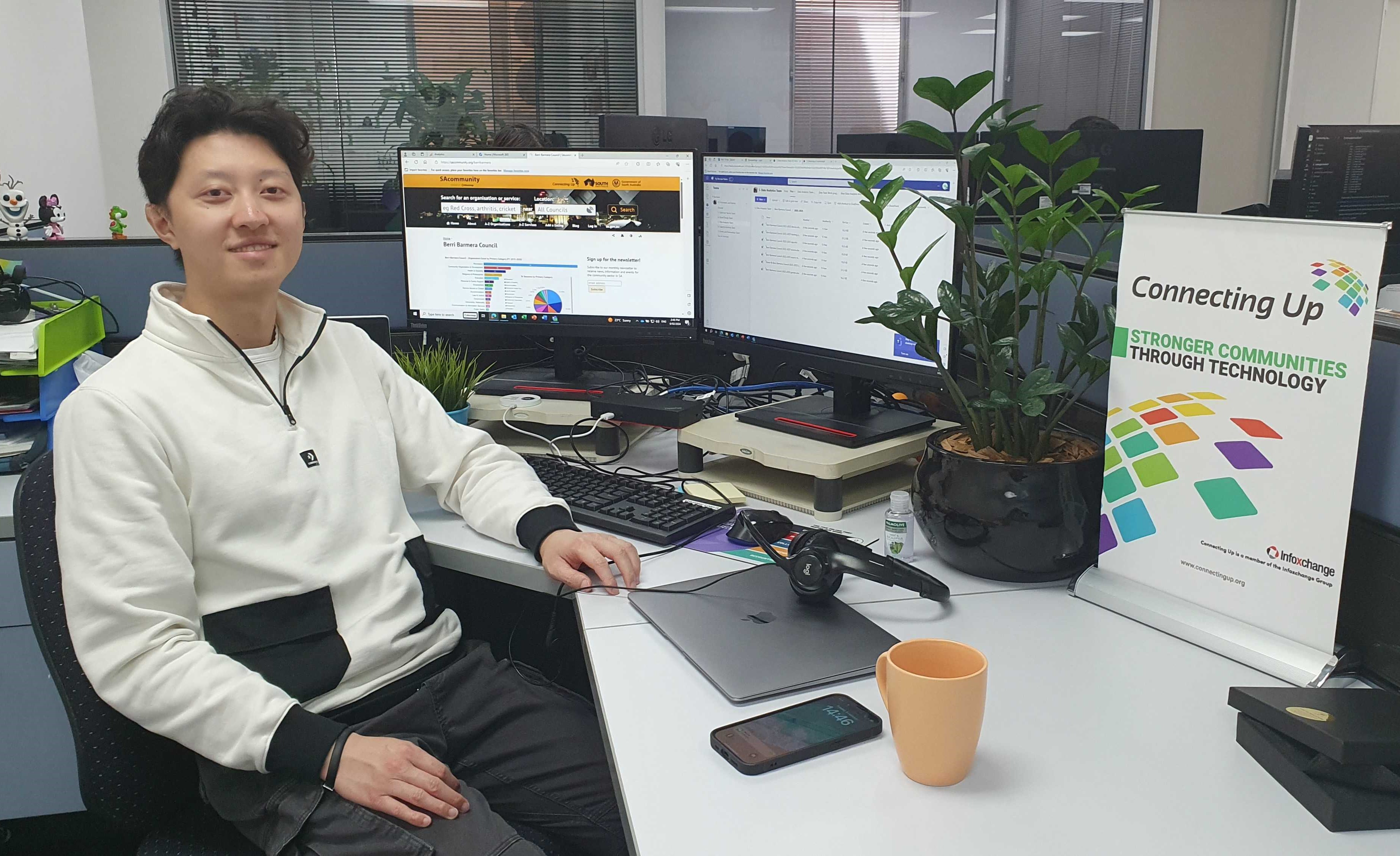
Welcome Yi Han!
Yi Han joined our SAcommunity Data Analytics Team for his University of Adelaide SET (Sciences, Engineering and Technology) Internship for his Masters of Data Science Trimester 1, 2024: 23 January 2024 - 23 June 2024.
He is completing a 280 hour internship onsite with SAcommunity at the Connecting Up Office, Infoxchange for 2-3 days (21 hours) a week for ~16 weeks around his classes.
Total Hours 60 Joined 23 January 2024 Last Check-in 20 March 2024
Personal Biography
Yi is a second year Master of Data Science student at the University of Adelaide. He previously worked in the civil aviation industry in China for more than 4 years and is a teaching assistant for the Foundation of Computer Science A/B course at the University of Adelaide for the 3rd trimester 2023. Since June 2023 he has been working as a research assistant under Professor Weitong Chen in the School of Computer and Mathematical Sciences.
In his role as a research assistant, he actively participates in lab projects which involve data mining, model development and evaluation. He also has contributed to composing comprehensive reports on project outcomes, assisted in managing the research group, mentored new students and participated in the peer review process for papers submitted to Association for the Advancement of Artificial Intelligence (AAAI). His paper on adversarial attack on time series classification was finished during the first year of his masters programme.
As an intern at Connecting Up, Yi is eager to gain more hands-on experience in data analytics and to meet new people, in the future he plans to apply his skills and aptitude in the academic sector towards a PhD in Artificial Intelligence before moving into the industrial sector.
Community Services in Councils Project
Yi Han selected Berri Barmera for his Power BI council reports, a database of approximately 244 community services operating in the area for the financial year 2022-2023. His reports followed previous visualisation report work by Hang Zhang, Renu Bala and Stathis Avramis, and his completed report can be found published >>here, he has also utilised a 4-year comparison template created by Harsh Bhatt in Power BI to then input and compare the Berri Barmera reports for further data insights.
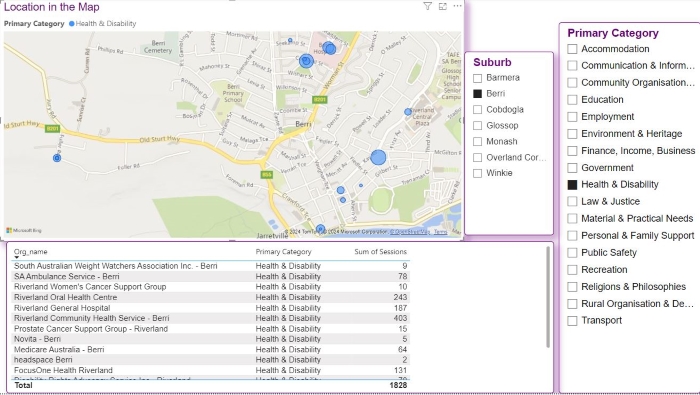
Furthermore, Yi has extended his community service council project by creating map visualisation with the help of Kane Hengchuan Zhao and Harsh Bhatt. These new visuals aim to enrich his report by offering location analytics for community services operating within the council area. Combining service data on a map with geospatial analysis provides new insights and helps to explore services and how they might affect community needs, influence social participation and service site/provision selection decisions. This map visualisation in Power BI can be found >>here. To help others make this map visualisation faster, Yi made a template which can be utilised by each team member.
There are a number of steps involved in the creation of community service information data presentations. A summary of data trends prepared, using information from Google Analytics and SAcommunity with subsequent Power BI and Canva reports revealing data anomalies and corrections required, the database is updated and reports re-created with improved information. Final data reports are published to the website, eventually these will be introduced to council stakeholders for information and/or feedback by email or phone.
Council Contact
Yi contacted Berri Barmera Council on April the 3rd, 2024 by email and April the 10th, 2024 by phone to raise awareness of the SAcommunity service with potential stakeholders, that is council staff working in community consultation or community development areas, to present his publicly available data reports which can be used as another tool to understand their community needs in the area.
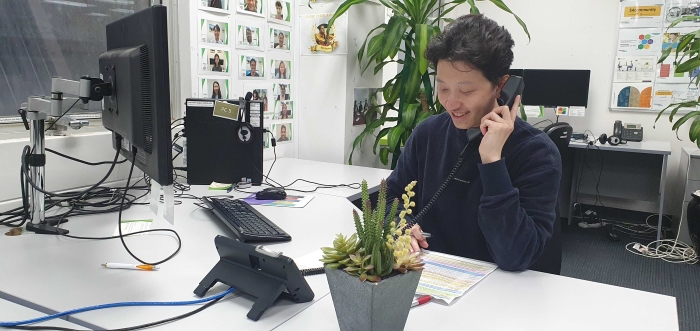
Work experience - Internal/External Connections & Networks - Meetings, Training and Events
Volunteers and interns are encouraged to attend monthly SAcommunity Team meetings, Connecting Up staff meetings, as well as quarterly all-staff Infoxchange Town Hall meetings to understand more about the organisation as a whole.
Organisation-wide news, events and projects are communicated through the staff channels, with weekly CEO Updates from David Spriggs, informal 'Lunch and Learn' educational sessions, and network meetings create connections with staff and other volunteers. Interns are also given opportunities to attend stakeholder and partner events.
Connecting Up Monthly Staff Meeting
13 February 2024
At the monthly Connecting Up staff meeting I met all staff with interns and volunteers in the board room to listen to the monthly work reports The assembly provided a platform for all participants to discuss their contributions and accomplishments.
A notable aspect of this gathering was the formal introduction of the new Chief Operating Officer, Ms. Jo Davies. Ms. Davies is a friendly and cheerful person. She shared her interesting career story in detail and the process of getting the COO role. The key takeaway for me is to always connect with people proactively and always be brave when taking on new roles.
12 March 2024
During this Connecting Up meeting, each staff member presented updates on their recent work activities, indicating a smooth progression of tasks and overall satisfactory job performance across the team.
Additionally, it was formally announced that Tina, a valued member of the staff, has tendered her resignation from Connecting Up. This meeting marked her final attendance as part of the organization as she moves into a newly created government role.
9 April 2024
In this monthly Connecting Up staff meeting, each staff member presented updates on their recent work, the progress of each team can help other teams. In the end, Pankaj said we should reevaluate whether it is worth it to have more than 20 people attending the meeting. it reminded me that in Australian culture, attending staff meeting is not just a formality requirement, we attend because we can benefit from it, or we are wasting our time.
Lunch & Learn Sessions
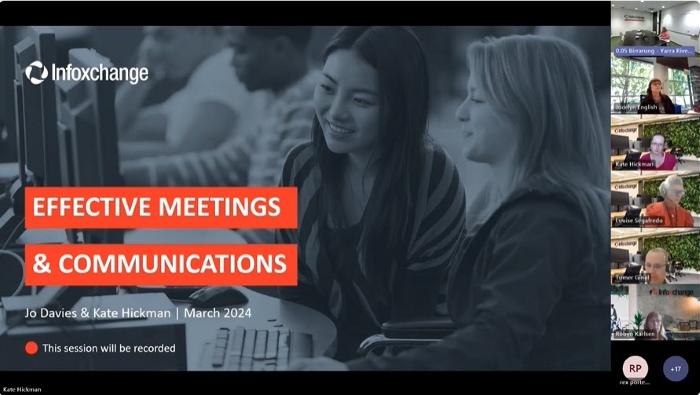
Effective Meeting & Communication Skills 5 March 2024
This meeting was presented by Kate Hickman and Jo Davies. They explained in detail the available communication channels, how to plan and run meetings and deliver outcomes, tips for effective written communications, informal communication rules of thumb, social media and promoting.
My takeaway from this session is that effective communication is essential for every team to succeed, it is the ability to connect with others and foster understanding and alignment. The content in this meeting gave directions on how to conduct effective communication in an Australian company or organization. This is the kind of meeting we need the most and it was worth reflecting on and allocating more time to than other webinars and meetings. There are etiquettes for me to meet and the most efficient way to learn is immerse in the environment and reflect constantly.
World Autism Month 5 April 2024
This meeting was presented by Jim Mullan (CEO at Amaze). He introduced Amaze as the leading autism organisation that has been driving changes in Australia so that autistic people and their families can live their best lives. He also talked about the challenges people with autism face, like getting the right support. He emphasized how important it is to detect autism early and give support.
My takeaway from this session is that it's always important to be kind and include people with disabilities. Autism is an invisible disability and it is common that many people interact with autistic person regularly but would have no idea.
Surplus for Purpose 16 April 2024
This meeting was presented by Tomer from Infoxchange. He explained the connection between surplus and purpose is that they support each other. It was actually a finacial lesson for everyone.
My takeaway from this session is that surplus doesn't conflict with purpose. Surplus serves the purpose and it is reinvested in the community.
IX Stakeholder Events
Data Catalyst Network (DCN): Brings together people from across sectors, to break cycles of disadvantage through the innovative use of data.
Participants of the Data Catalyst Network will advance their data maturity while sharing and improving data insights through unique cross-sector partnerships to disrupt disadvantage. As a collective, the network will harness data and knowledge from the not-for-profit community sector, academia, government and business to better use and manage data to improve the lives of people across Australia.
DCN: Augmented Intelligence; Combining Organisation Data with Large Language Models 29 February 2024
This webinar was presented by Amir Aryani, he summarised the challenges in integrating LLMs into organisations' data workflows, explained how Augmented Retrieval Intelligence (RAG) works and why it can give organizations full control over their data. At the end, the presenter introduced some operational challenges using RAG.
What intrigues me the most is when Amir explained basic theories on RAG by diagrams of three papers because I have been doing research on AI. I learns how he tried to make the concepts easier to understand because theories are not what organisations want to hear and they are difficult to understand when you are not experienced in AI. Additionally, when Amir answered questions he joked on the gap between academia and industry where in academia, failure of trying can still be a success but there are lots of risks of implementing new functions in the industry. This gap is natural to me. Both academia and industry can collaborate more closely to understand each other and grow together which can starts from collaborations between universities and organisations.
DCN: Indigenous Data Sovereignty 20 March 2024
This webinar was presented by Jim O'Shea, COO & Company Secretary at VACCHO. The session focused on the fundamental rights of Aboriginal and Torres Strait Islander peoples regarding the governance, ownership, and use of data related to them and their communities. These rights are supported by the United Nations Declaration on the Rights of Indigenous Peoples (UNDRIP) and are further guided by principles such as the CARE Principles and those from the First Nations Information Governance Centre. The webinar also addressed the challenges faced by these communities, particularly the obstacles in accessing, controlling, and giving consent for the use of their data.
My takeaway is there are urgent need for improved transparency, data-sharing agreements, and co-governance models for the aboriginal and Torres Strait Islander people. The proactive measures by community-controlled organizations to manage their data are inspiring examples of moving towards self-reliance and governance. This session was not just informative but also a call to action for supporting equitable data practices.
DCN: Tools to get control of your data 24 April 2024
In this webinar, Marcello Sequeira, the Information and Data Architect at the Benevolent Society, opened the session by discussing the decision to adopt Microsoft Fabric as their data platform. He detailed the challenges of data management in the nonprofit sector, particularly the integration and utilization of diverse data systems to enhance organizational efficiency.
Following Marcello, Benny Austin provided a detailed demonstration of Microsoft Fabric's core capabilities, including data import, cleansing, integration, and visualization reporting. He meticulously outlined the process from data sourcing to platform analysis, highlighting how Fabric supports real-time data processing and analytics.
My takeaway is that Microsoft Fabric is a unified data platform allows organizations to better support their mission by maximizing data utilization. With the development of AI, there will be more automation features that can simplify analytical processes of data and ensure data safety and compliance.
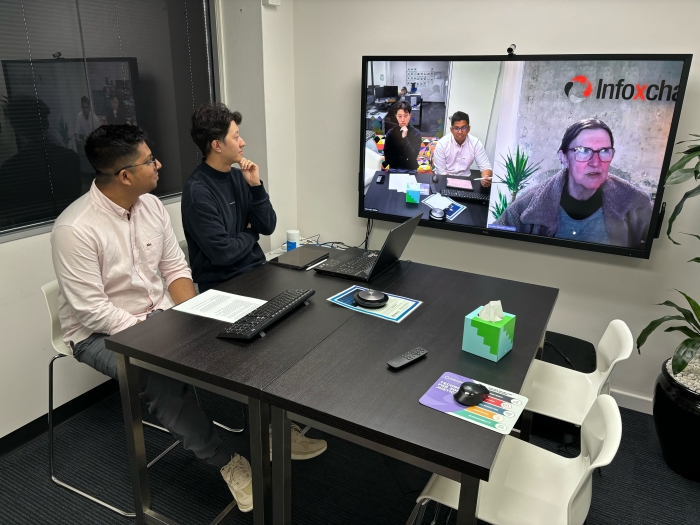
Mentor Meeting
Connecting Up Volunteers and Interns are provided with the opportunity to select staff members from across the wider Infoxchange organisation for an informational mentor meeting. Here they have the opportunity to ask more about staff members job roles and employment journey, and learn about their career and professional development, to gain insights and guidance that can be applied towards their own success.
Yi has selected Kristen Moeller-Saxone, the Data Capability Lead at Infoxchange, as his mentor because she had a PhD degree and extensive experience in data and innovation, and she helps various non-for-profit organizations to set up data strategy roles in their organization. Yi is interested in research and will move into industrial sector afterwards so Kristen is an ideal mentor for him.
Here are my key takeaways from this mentor meeting:
1. PhD is a huge commitment. If you do it only for pragmatic reasons it would be very difficult.
2. Chanllenge for not-for-profit sectors is that they currently don't have the capability to work with big data so the governments are blocking them. Go to finance or legal sector etc. if you want to be at the forefront of technical skills.
3. Making connections, working on projects and building skill sets are all essential.
4. Always seek opportunities to get exposure.
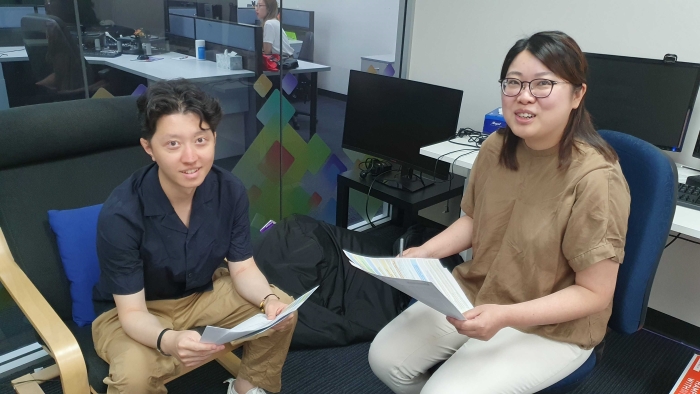
Telephone Techniques
At Connecting Up, opportunities are created where volunteers and interns undertake sessions in-house to learn a universal telephone script, and practice introducing themselves, their services, and to gather information. Firstly through demonstrations with our Customer Service Team Lead, David Webb, and secondly in practice workshops with our long-standing volunteers and also with their peers. When students are ready, they can begin to contact community services where data is older or anomalous, ahead of contacting council stakeholders to introduce data reports to stakeholders.
Digital Training & Development
Volunteers and interns have access to the Connecting Up Digital Learning Platform providing live webinars and recorded webinars, workshops and webcons presented by subject-matter experts to understand more about a range of technology topics for the not-for-profit sector.
Relevant training sessions were selected, attended, summarised and assessed by Yi to look at how these sessions can enhance his internship experience have included:
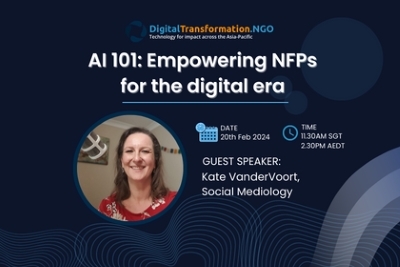
Webinar 1: AI 101: Empowering NFPs for the Digital Era
The webinar was presented by Kate VanderVoort from Social Mediology, she provided a detailed overview of how artificial intelligence can be leveraged by nonprofit organizations. Through the webinar, I got basic knowledge about different types of AI, common terms of AI and understood some examples on how to implement AI in organizational settings, such as enhancing content creation, improving volunteer management, and optimizing donor personalization. In conclusion, this webinar illustrated AI's transformative potential in nonprofit organisations and basic knowledge on how/why to utilise AI.
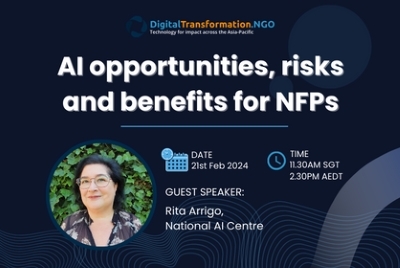
Webinar 2: AI Opportunities, Risks, and Benefits for NFPs
The webinar was presented by Rita Arrigo at the National AI Centre at CSIRO, she delved into the transformative power of AI for not-for-profit organizations. The session highlighted the expansive role of generative AI in content creation, the utilization of AI algorithms for operational efficiency, and the enhancement of accessibility through technology.
The key takeaway for me is that AI has impacted our lives in every way possible and that's why every organisation needs more AI engineers and researchers which encourages me to delve into this field.
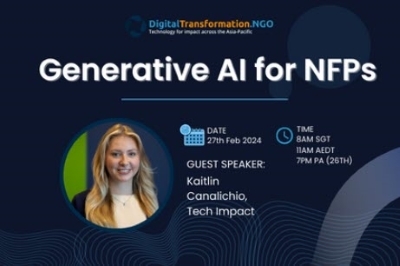
Webinar 3: Generative AI for NFPs – Digital Transformation
This webinar was presented by Kaitlin Canalichio from Tech Impact's Data Innovation Lab. She introduced basic concepts about AI, ethical considerations of using AI ( privacy, transparency, bias, safety and accountability). Then she gave examples about non-profit organisations using AI and explained basics on prompt engineering.
The key takeaway for me is that we need to be very careful about the data we provide to AI, always double check the answers and understand your individual organisation's policy.
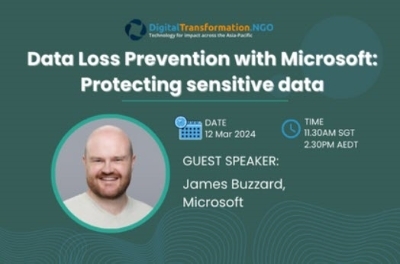
Webinar 4: Data Loss Prevention with Microsoft - Protecting sensitive data
This webinar was presented by James Buzzard from Microsoft ANZ. He emphasized the increasing importance of data loss prevention and introduced how to identify and classify sensitive data. Microsoft's Data Loss Prevention (DLP) solutions offer a robust set of tools and services to address this challenge effectively. He showed how to implement Microsoft’s DLP products in the end.
In today's digital landscape, safeguarding sensitive data is paramount for any organization. This is the first cyber security webinar I attended and it gave me detailed information on how to use Microsoft Purview to help govern, protect, and manage data estate.
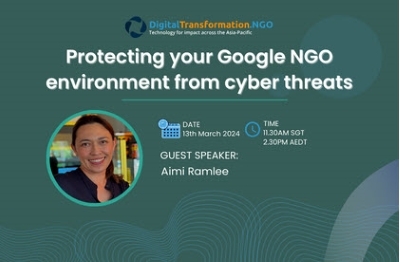
Webinar 5: Protecting your Google NGO environment from cyber threats
This webinar was presented by Aimi Ramlee, a co-founder of Tyne Solutions. She introduced Google Workspace and why cybersecurity is paramount to NGOs. Then she provided various methods to protect Google Workspace and checklists for smaller NGOs and larger NGOs respectively.
The key takeaway for me is that even though you got a secure system, the performance of protection can be compromised if your team are not knowledgeable and empowered enough. Thus, trainning employees is also paramount to the security of the environment.
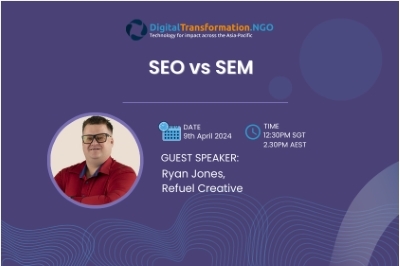
Webinar 6: SEO vs SEM
This webinar was presented by Ryan Jones from Refuel Creative. He explained the differences between Search Engine Optimisation (SEO) and Search Engine Marketing (SEM). He also covered various methods that improve the rankings of your sites on search engines.
Nowadays, due to the prevalence of generative AI, we must not use it to help with the writing or humanize the content before publishing on the site because search engines would prioritise the sites whose content is helpful and attract people.
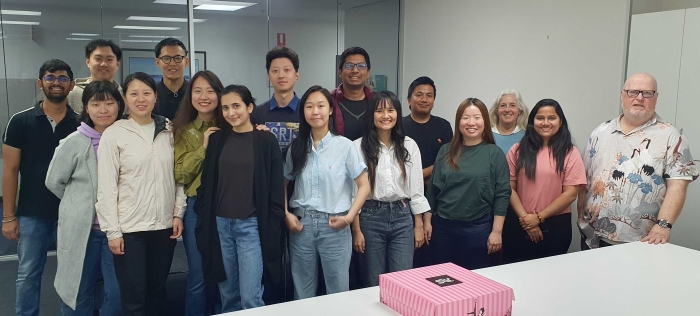
Short summary of this internship by Yi Han:
During my internship with SAcommunity's Data Analytics Team from January 23rd to May 10th, 2024, I gained rich experience in industry especially in not-for-profit sectors. By working on the Berri Barmera project, through trial and error, I learned how to use Power BI to make visualisation and reports and how to articulate my insight into comparison by data each year to make my reports to the council more well-rounded. This hands-on experience provided me with a unique opportunity to bridge theory with practice which is not possible in any university course. Contacting the council was also an exciting experience because I found immense satisfaction in applying my skills to contribute meaningfully to the local society and help them make better decisions and better services.
Engaging in stakeholder events like the Data Catalyst Network webinars exposed me to emerging trends like augmented intelligence and deepened my understanding of data ethics. Lunch & Learn Sessions gave me knowledge about Australian working culture and opportunities to learn in a relaxing presentation. Connecting Up Monthly Staff Meeting immersed me in an Australian working meeting to listen to other staff talk about their contributions and accomplishments. There were also massive free online learning resources open to me covering tools like Power BI, Excel, Google Analytics, and IT management.
Furthermore, engaging in mentorship sessions with Kristen Moeller-Saxone, the Data Capability Lead at Infoxchange, provided me with invaluable guidance and support. Kristen's extensive experience in data and innovation helped me gain a deeper understanding of the challenges and opportunities in data analytics and she is always very generous to share her experiences.
In addition, there were opportunities for everyone to practice 'elevator pitch' which is essential in western work environments. There is a session that everyone can learn personal branding and polish it which is also critical.
Overall, my internship experience at SAcommunity has been instrumental in shaping my career aspirations as a data analyst. I am confident that the skills and knowledge I have gained during this internship will empower me to make meaningful contributions to organizations and companies especially to which seeking to leverage data for informed decision-making and positive social impact.
Sign up for the newsletter!
Subscribe to our monthly newsletter to receive news, information and events for the community sector in SA




